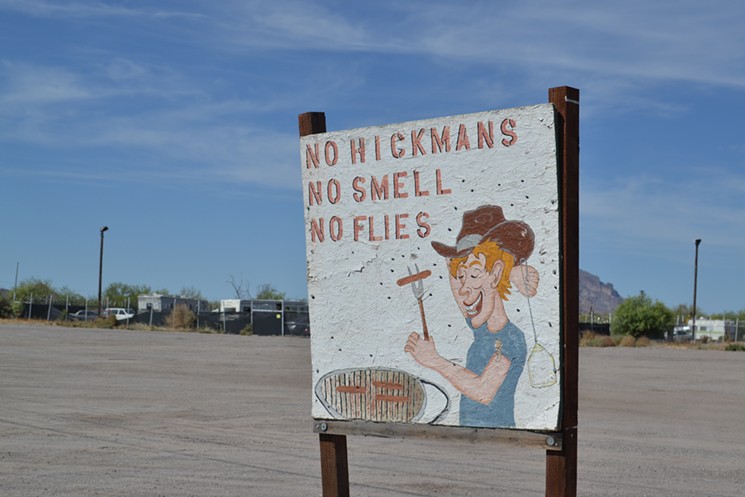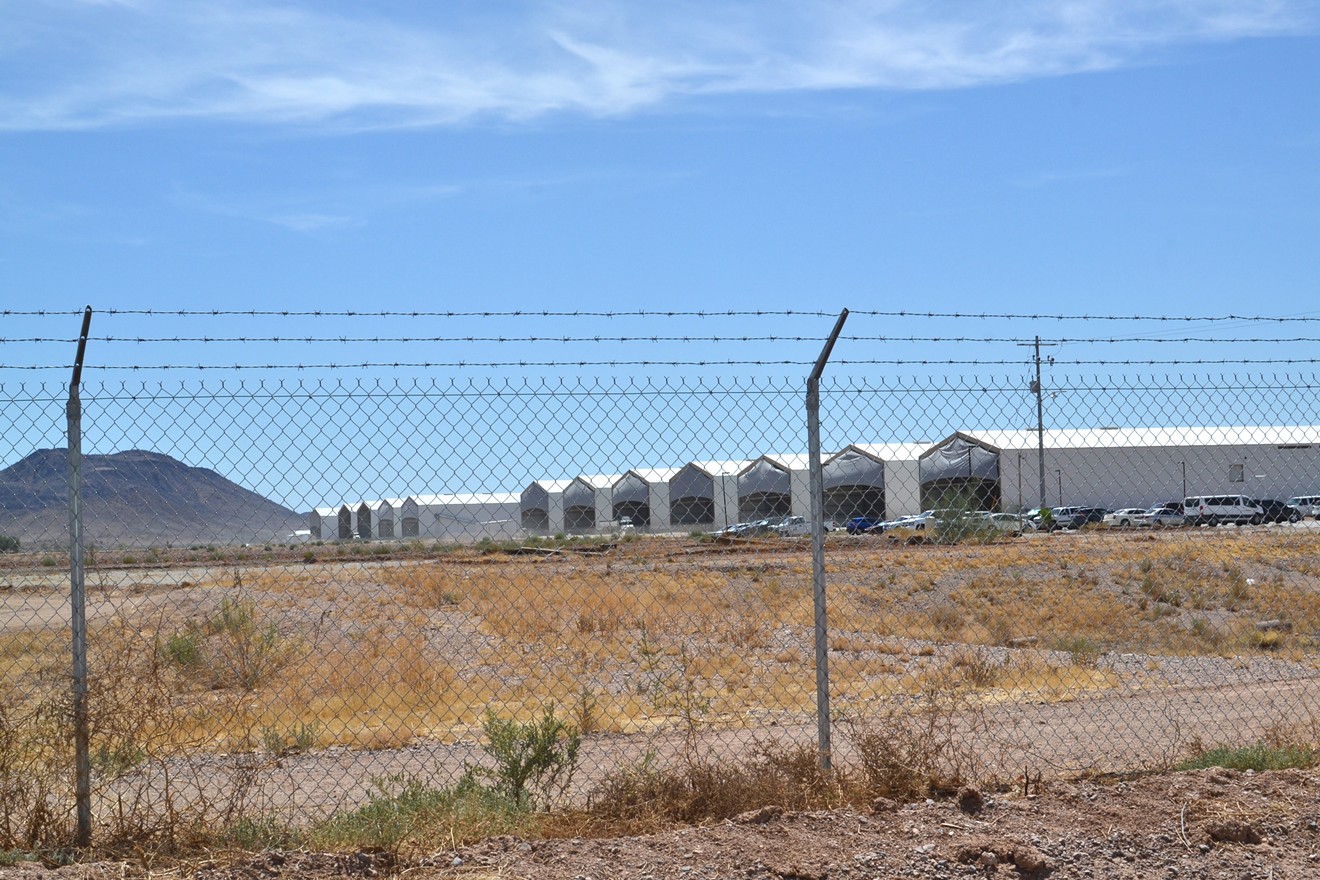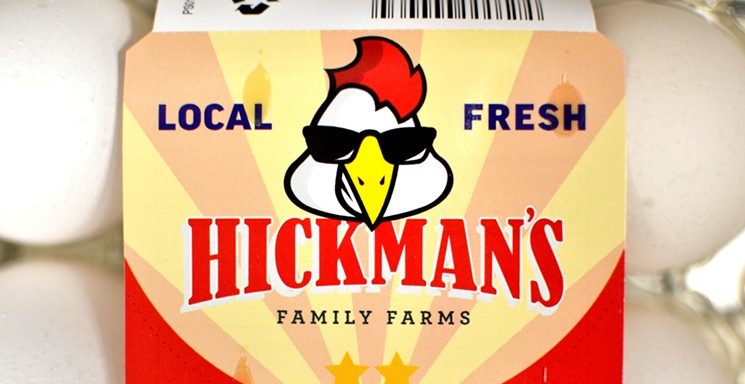Avilla and her husband, Tim, are among roughly three dozen Tonopah residents suing Hickman’s. Their nuisance lawsuits, filed in July 2017 and consolidated with other lawsuits against Hickman’s in November of that year, contend that the gut-wrenching stench of chicken poop and other offenses — flies, loaded trucks speeding and spilling manure and chicken guts on the streets — from the 3 million-hen egg factory Hickman’s built in 2014 has caused them emotional distress and deprived them of their right and ability to enjoy their property.
Since the legal battle began, Hickman’s, which says it is the largest egg company in the Southwest, has made the plaintiffs’ lives even more stressful and difficult. Invasive tactics that company lawyers have deployed appear more like bullying and intimidation and less like a good-faith legal strategy, court documents and interviews with residents indicate.
In addition to surveilling them with drones last year, Hickman’s sent videographers and lawyers into plaintiffs’ homes and onto their property this summer. In the spring, a judge allowed the company to force plaintiffs to sign releases that gave Hickman's lawyers access to private medical information.
“They’ve asked so much of us, trying to get us to drop out of the lawsuit,” said Linda Butler, another plaintiff, whose house is about two and a half miles west of the egg factory. “They have no conscience.”
‘Do You Recognize This?’
Avilla quickly realized that someone working for Hickman's or its lawyers had taken video surveillance of her and her husband's home and their 60 acres of property, which is about two miles west of the egg factory, when she arrived at her deposition with defense lawyers last summer.“They were like, we have some footage that we’re going to show you, and we’re going to ask you questions about it,” she recalled. “When they flew it over my goat pens, they’re like, ‘Do you recognize this?’”
The lawyers showed her one or two video clips, she said, including one where the drone got so close to her ranch cattle dog, who protects the goats, that he flew into a panic.
“I said, ‘You got a little close with that drone,’” she recalled telling the lawyers. “That pissed Hoppy off.”
Avilla did not know the exact date that the drone hovered over her and her husband’s property, but she thought it might have been in June 2018, when it was hot enough for no one to be outside and for their swamp cooler to be running, which would have masked the drone’s hum.
She and other plaintiffs speculate that Hickman’s is gathering this evidence in an attempt to eventually argue that the source of the stench and the flies in Tonopah is not its millions of chickens.
“They want to blame the stench out here on everybody else’s animals,” Avilla said. “Ten little goats don’t smell like 2 million chickens.”
Court records indicate that Hickman’s facility in Tonopah has around 3 million chickens, with a capacity for up to 4.3 million.“Ten little goats don’t smell like 2 million chickens.” - Jackie Avilla
tweet this
Those plaintiffs also believe that the company is trying to force plaintiffs to give up and drop the case — which five to 10 plaintiffs have done so far, for various reasons, court records show. Whether or not those theories about Hickman's intentions are accurate, the tactics breed resentment and exhaustion among the plaintiffs.
“They’re just going to bully you, and bully you, and bully you, until you give up,” Avilla said. The case is not scheduled to go to trial until 2021.
In August 2018, the plaintiffs in the nuisance lawsuit asked Hickman’s to hand over “any and all of the surveillance items ... which you have with regard to any Plaintiff in this action and/or said Plaintiff’s home/property,” including videos and photographs, court filings show.
Hickman’s objected, and eventually, in February, a judge ruled that Hickman’s could claim that the surveillance could be considered “work product” — legalese for materials that attorneys prepare for litigation and can keep confidential.
The only photographs and videos that Hickman’s had to share were those already shown to the plaintiffs during depositions, Judge Janice Crawford decided.
As a result, the Tonopah residents embroiled in this bitter lawsuit against Hickman’s do not know the full extent of the photographs and videos the drones might have collected of their homes and property. Nor do they know, unless they catch a drone in action, whether the filming continues.
‘Nothing Is Private Anymore’
This year, the company’s intrusiveness continued.One dispute began in March, when lawyers disagreed on whether or not Hickman’s had the right to access the plaintiffs’ medical records.
Lawyers for the Avillas and other plaintiffs claimed that such a request was “overly broad.”
The company “has requested records from all Plaintiffs’ healthcare providers and treatment,” they wrote. “This serves only to harass.” In one case, they pointed out, Hickman’s lawyers asked one plaintiff for counseling records dating back “20 years [before] the Egg Factory’s existence.”
They asked the judge to limit Hickman's request to records from counseling and therapy specific to the stresses of living with a giant egg factory in the neighborhood.
But Hickman’s lawyers argued that if the Tonopah plaintiffs were going to claim that the egg factory had caused them “discomfort” — coughing, watery eyes — then they had every right to see their medical records.
They also argued that, if the Tonopah plaintiffs claimed that Hickman’s had "caused [them] to suffer severe emotional distress,” then Hickman’s was entitled to scour the medical record to see whether those documents supported the claim, the lawyers wrote in another statement, filed in early May.
“Hickman’s is entitled to explore whether Plaintiffs’ complaints of runny noses, itchy eyes, and the link, are the result of Hickman’s presence or some other cause,” they wrote. “Without discovery of Plaintiffs’ medical records, Plaintiffs are free to point all blame at Hickman’s for emotional distress while concealing other potential stressors.”
In May, the judge sided with Hickman’s.
And so, in order to press forward with the case, Linda Butler signed the release forms allowing Hickman’s to go through her medical records.
“My husband and I have got nothing to hide,” she said. Lawyers for the company had already asked her if she’d seen any doctors for mental health reasons, anxiety attacks, and the like. “We didn’t, so they couldn’t pick on us for that.”
For other plaintiffs in the case, releasing medical records might expose information and history they fiercely want to keep private.
Even for the Butlers, Hickman’s pushy tactics constituted “a real invasion,” Linda Butler said. “Nothing is private anymore. Sad to say, huh?”
Butler’s property was also visited by a drone, but she didn’t see the footage from it until her first deposition earlier this year. Seeing it didn't surprise her, because neighbors had already warned her. From the footage, the drone seemed to hover 20 or 25 feet above the ground, she estimated.

Since 2014, Tonopah residents and businesses have tried to fight back against Hickman's, the biggest egg producer in Arizona.
Elizabeth Whitman
Such drone activity falls into a legal gray zone.
The federal government has only a guide of voluntary best practices regarding drones and privacy, according to Ian Gregor, a spokesperson for the Federal Aviation Administration. The FAA has no authority over privacy issues, because it is a safety agency, he added.
People and entities simply have to register drones with the FAA, and they have to follow rules about where they can and cannot fly. Phoenix New Times has requested but yet to receive records for drones registered to Hickman’s or its lawyers.
In Arizona, operating an aircraft “in a careless or reckless manner that endangers the life or property of another” is a class 1 misdemeanor, per state law, but such a determination is left to a court.
State criminal code also bars drones from “intentionally photograph[ing] or loiter[ing] over or near a critical facility.” Places in Tonopah do not appear to fall into the category of "critical facility."
“The law is pretty unclear in this situation,” Jay Stanley, a senior policy analyst with the American Civil Liberties Union, said. “It’s a little bit of a Wild West when it comes to drone surveillance.”
Stanley said that Hickman’s use of drones was a reminder for “why we need good strong privacy laws so that powerful entities don’t have excessive power over individuals.”
‘To Take Pictures and Videos of Everything They See’
In late July, the lawyers for Hickman’s returned with videographers — the same ones who filmed depositions, Butler said — to scour and film 15 plaintiffs’ homes of Tonopah. They made plans to visit four other homes later in the year.That request came after the plaintiffs’ lawyers, and their experts, inspected the Tonopah egg factory in early June.
In a court filing, the plaintiffs’ lawyers labeled Hickman's move to enter plaintiffs' homes as retaliation. Nevertheless, they advised plaintiffs like the Avillas and the Butlers, to agree to the request, for the sake of the case.
Six people showed up at each home for the filming: two attorneys, a paralegal, an expert, and two videographers, according to court documents.
“In the homes, Defendant intends to enter each room, to open closets and drawers as Defendant finds appropriate, and to take pictures and videos of everything they see,” Hickman's lawyers wrote in a court filing shortly before the visits.
At the Butlers’ home, the videographers probed for mold in windowsills, and looked for standing water and piles of manure, Linda Butler recalled. “What they were trying to show was that the smells we were smelling were coming from our own property,” Butler explained. She said she and her husband, Mike, don’t have any animals.

Tonopah residents say that swarms of flies descended on the community after Hickman's began operating its egg factory there.
Elizabeth Whitman
Nick Verderame, one of the lawyers for the plaintiffs, said his clients had nothing to hide, but that such tactics were intrusive nonetheless.
“There’s no question that flying a drone over someone’s home without asking them, and without telling them, and without them knowing until they either see the drone flying or until they’re shown video after the fact is offensive and invasive,” he said.
Bringing videographers into people’s homes, he said, was “repugnant.”
“Our clients were bothered by Hickman’s going into their homes to inspect their most private places,” Verderame said. “But our clients have nothing to hide. Hickman’s is the one that’s creating this problem.”
A Factory, Not a Farm
Four lawyers for Hickman’s, with the firm Stinson LLP, did not respond to emails and follow-up messages seeking comment about the use of drones to surveil plaintiffs in this case.An assistant at the firm said that two of the lawyers, Larry Wulkan and Jennifer Allen, were busy with a trial, and that another lawyer, Michael Manning, was semi-retired. The fourth, James Holland, Jr, did not respond to a voicemail seeking comment.
Jim Manos, the company’s chief financial officer, did not respond to a voicemail and a email with detailed questions regarding this story.
In the past, Manos has contended that Tonopah residents who complain about the smell should have known they were living in an agricultural area.
“They did give their tacit approval when they chose to buy and live in an area zoned such that it allows for nonresidential agricultural enterprises,” Manos wrote in an op-ed in the West Valley View in May.
“Even if they didn’t read that in the paperwork they signed when they purchased property there, they had to be aware of it as there were and still are farm fields and dairies all over Tonopah,” he continued.
Residents like Avilla vehemently disagree. “That’s not a farm,” Avilla said with disgust. “That’s a factory.”
Hickman’s doesn’t just meet the definition of a Concentrated Animal Feeding Operation, or CAFO. It exceeds it, several times over, with its 3 million hens.
The EPA definition of a large egg CAFO starts at 30,000 or 82,000 hens. In its Tonopah barns, Hickman's keeps about 3 million.
tweet this
According to the federal Environmental Protection Agency, a large egg CAFO has at least 30,000 or 82,000 hens, depending on the manure handling system.
Tonopah has about 2,300 homes, according to numbers from the U.S. Postal Service that were filed in court records. The unincorporated community sits just south of Interstate 10, about an hour west of Phoenix. Its main downtown establishments are a gas station with a Subway and a Mexican restaurant, with the post office down the road.
Avilla and her husband first bought a 40-acre parcel in Tonopah in 1999. Five years later, they acquired the adjacent 20 acres and moved there, planning to retire and enjoy the rural peace and quiet.
Ten years later, the egg CAFO changed all that. And now, when Hickman’s suggests that if people don’t like it, they should leave, Avilla becomes furious.
“Where in the hell am I supposed to move to?” she cried. “And why should I have to move?”













